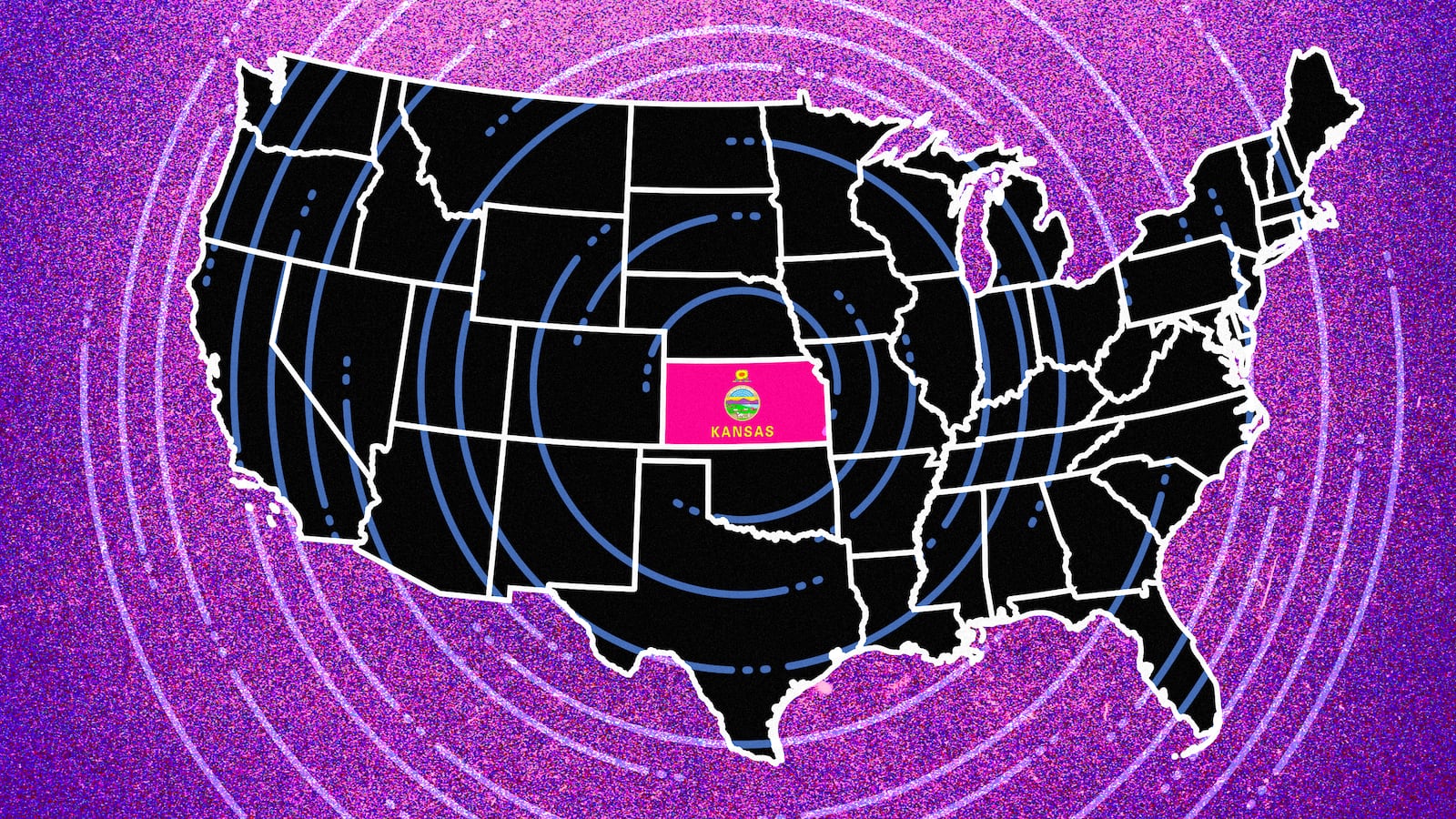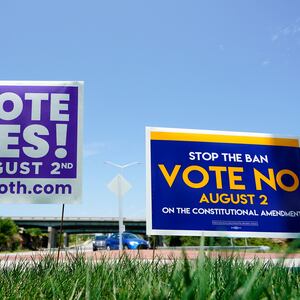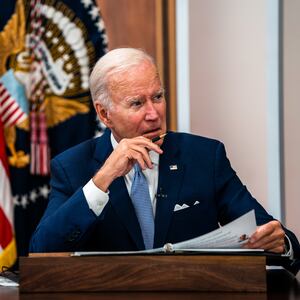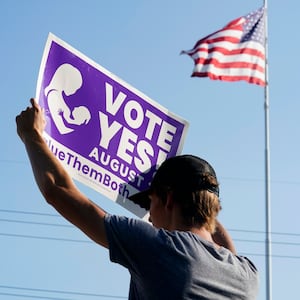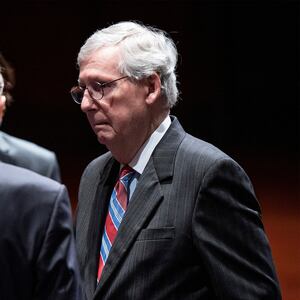The best political week of the year for Democrats concluded on Tuesday night with a forceful punctuation mark in an unexpected place: deep-red Kansas.
Voters went to the polls there for their primary election and overwhelmingly rejected a ballot measure designed to restrict abortion access in the state.
That result seemed to offer a decisive answer to one of Democrats’ most burning questions ahead of the 2022 midterms: How big will the backlash be from the U.S. Supreme Court’s decision in June to strike down the national right to an abortion?
A massive defeat for the anti-abortion movement—in every congressional district of a state Donald Trump carried by 15 points in 2020—prompted Democrats to talk up a massive backlash brewing against GOP candidates who push anti-abortion positions this fall.
“This spells bad news for House Republican candidates as the GOP plots to institute a nationwide abortion ban,” trumpeted a release from the Democratic Congressional Campaign Committee.
On Wednesday, President Joe Biden tweeted that the Supreme Court and congressional Republicans don’t “have a clue about the power of American women.”
“Last night in Kansas,” Biden said, “they found out.”
If Democrats seemed to be feeling themselves a bit more than usual in the wake of the Kansas result, it’s because they were.
The last year has largely been a brutal one for Biden and his Democratic allies, but in the last week alone they signed into law a massive investment in high-tech manufacturing and struck a breakthrough deal in the Senate on their long-awaited climate and tax package.
Meanwhile, Republicans in Congress have spent the week opposing the manufacturing bill they’d previously supported, found themselves arguing against a historic health-care bill for veterans, and vowing to fight against legislation to codify same-sex marriage rights. Recent polls had, finally, shown Democrats remaining competitive in the battle for Congress.
If Kansas was the cherry on top of an increasingly coherent midterm case for Democrats, those closest to the push to protect abortion rights in the state had a few grains of salt to offer.
Ashley All, spokesperson for one of the leading groups pushing for a “no” on Kansas’ referendum, let out a chuckle when she was read the DCCC’s statement on the election result.
“It is accurate to say the vast majority of Americans support access to abortion care, and the vast majority of Americans believe that people ought to have the right to make private medical decisions, and decisions about their body, for themselves, and their families, free of government interference,” All said. “That’s all I’d say is demonstrated through the vote yesterday.”
Stephanie Clayton, a former Republican who is now a Democratic state lawmaker in Kansas, said the result is not “some magic referendum” for the party.
“Believe you me, I certainly hope that’s the case in November,” Clayton said. “But this is really a conservative state doing what conservatives do, which is to tell the government to stay out of their lives.”
There is an explicit difference in voting for a referendum to protect abortion and a Republican swinging to vote for a pro-choice candidate. A referendum only requires voters to agree with the singular policy in question—while choosing a candidate or party to vote for is often a decision made on the aggregate of multiple political takes blended together.
But national Democratic operatives are hoping discontent among Republicans after June’s Supreme Court ruling could be enough to push them left this cycle, even if it means leaving their conservative takes on issues like the economy or education behind. Polling does show that a majority of Americans support upholding Roe v. Wade and don’t favor outright bans on abortion, especially when exceptions are excluded.
Since the Dobbs decision came down, Republicans have argued that voters will be far more motivated by the poor economy, and President Joe Biden’s job performance, than by issues like abortion. The Kansas election—which saw a spike in voter registration after the court’s decision, mostly from women—appears to be a counterweight to that argument.
But despite Republicans’ posturing on the issue, they’ve been relatively mum since the Kansas referendum was rejected.
Sen. Roger Marshall (R-KS), an OBGYN by trade, mourned voters’ decision, writing in a statement on his congressional website: “Too many times I’ve seen sadness and hurt, without an explanation why—this is one of those moments.” But his fellow Kansas Sen. Jerry Moran (R-KS) did not have a statement on his site, nor did the three Republican members of the Kansas congressional delegation, Reps. Tracey Mann, Jake LaTurner and Ron Estes.
The Daily Beast also reached out to multiple national GOP groups to discuss the referendum; none replied.
Jesse Ferguson, a longtime Democratic strategist, argued the increasing silence from GOP leaders and candidates on abortion belies a hope that “no one remembers what they’ve done or what they want to do.”
“Voters rarely decide how to elect officials based on one issue,” Ferguson said. “But people are scared as fuck about what it means if these MAGA Republicans take power.”
While the congressional GOP’s leaders—Rep. Kevin McCarthy (R-CA) and Sen. Mitch McConnell (R-KY)—have not ruled out pursuing a national ban on abortion if they regain majorities next year, they have largely avoided talking about the issue.
Democrats have seized on that ambiguity, and operatives following congressional races argue they are key to elevating abortion as an issue in House and Senate races, which have a number of complicated issues at play.
Democrats need to emphasize that Republicans would be rubber stamps for McCarthy or McConnell, said one Democratic operative, given that they would be under immense pressure to pursue a national abortion ban if they take over the House and Senate next year.
“This isn’t the Women’s March,” the operative cautioned. “This is independent and Republican voters who don’t like that this has become the standard-bearer issue of the GOP.”
Meanwhile, abortion could prove to be even more potent in state-level races, where voters are selecting governors who could sign or veto new restrictions or protections.
David Turner, communications director for the Democratic Governors Association, argued Republicans’ restrictive stances on abortion only add arrows to Democrats’ quill, telling The Daily Beast there’s “strain of extremism within Republican candidates across the board that was turning off voters of all stripes.”
“The biggest case we can make is that Democrats are fighting for your freedoms and your rights, and Republicans are looking to take those away—and in some cases punish you,” Turner said.
That idea of pitching Republicans as the party of government interference on abortion was repeatedly utilized in the Kansas campaign to protect abortion. Kansans for Constitutional Freedom led multiple ads calling restrictions on abortion “another government mandate that puts our personal rights at risk” and arguing the proposed ban on abortion would be “replacing religious freedom with government control.”
Planned Parenthood Great Plains Votes—which represents Kansas, Arkansas, Oklahoma and Missouri—also said Wednesday that the Kansas vote is a case for candidates to embrace abortion outright, instead of shying away from an issue that’s often considered politically risky or volatile, especially when trying to appeal to moderates or independent voters.
“What we saw from Kansas yesterday tells us that reproductive rights are a galvanizing issue. People are talking about privacy and what it means to make decisions about your family and your life in ways that were not happening as publicly before,” said PPGP’s CEO Emily Wales.
The situation in Kansas was “pretty unique,” said All, the spokesperson for Kansans For Constitutional Freedom. But she did say that it offers several lessons for Democrats elsewhere. Candidates and groups who support abortion rights, All argued, would do well to communicate thoughtfully with a diverse array of voter groups.
“What we found is, this issue is not partisan to voters, and so, while political observers tend to look at it through a partisan lens, that is not the way the vast majority of the American people see it,” All said. “Progressive, reliably pro-choice voters were already engaged, but that shift really lit a fire under more moderate voters, some conservative voters, some libertarian voters, who just don’t want government in their business.”
Clayton, the Kansas state legislator, said Democrats’ ultimate message should be “these candidates want to run your life.”
“I respect you,” she continued, phrasing the Democratic messaging. ”You know how to run your own life.”
In other key states where abortion will be a major issue this fall, Democrats who have been crafting that message were energized by Kansas’ election—and they’re already using the outcome to inform their playbooks.
That includes Michigan, where there is a legal fight ongoing over the state’s pre-Roe abortion ban and Democratic Gov. Gretchen Whitmer is facing off against a Republican, Tudor Dixon, who has made extreme comments about abortion in the past.
Mallory McMorrow, a Democratic state senator in Michigan who came to national prominence recently for her pushback against GOP culture war attacks, said Democrats are “tying the threads together” of their case against Republicans like Dixon.
“It’s the party of small government running on a platform of how to raise your kids or what you can do with your body, especially if you’re a woman,” McMorrow said. “It’s long overdue that Democrats lean into, ‘We are the party of freedom and choices, and this Republican Party is trying to take away your choices.’”
